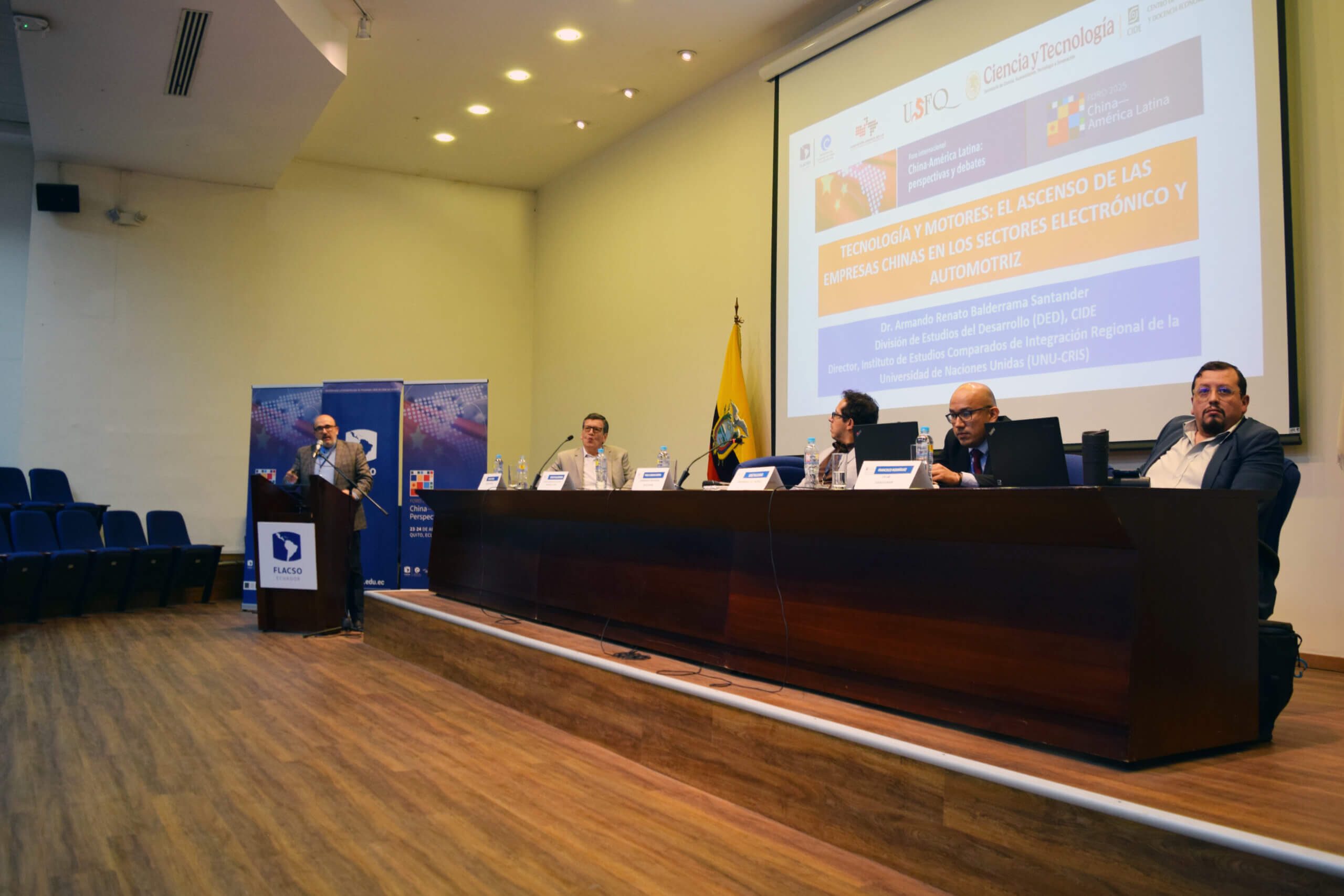Information and Communication Technologies
The third panel of the China – Latin America International Forum: Perspectives and Debates brought together experts from Mexico, Peru, and Ecuador to analyze the implications of China’s technological advancement in Latin America. Drawing on research in artificial intelligence, digital sovereignty, the digital economy, and industrial policy, the panelists reflected on the opportunities and challenges facing the region in a context of global technological transformation.
Renato Balderrama, researcher at the Center for Research and Teaching in Economics (CIDE, Mexico), presented his talk, “Technology and Engines: The Rise of Chinese Companies in the Electronics and Automotive Sectors.” Based on over two decades of research on China’s industrial policy, Balderrama argued that the U.S.–China conflict goes beyond trade and involves structural disputes over technology, economics, and geopolitics. He analyzed China’s transition from a manufacturing power to a technological leader through active planning strategies such as “Made in China 2025,” and contrasted this with the loss of competitiveness in the West due to financialization. He called for Latin America to rethink development through an autonomous industrial policy.
Pablo Cabrera, research coordinator at FLACSO Ecuador, focused his intervention on the ethical dimensions of artificial intelligence. In his presentation, “Innovation, AI Ethics, and the Need for XAI in a Sino–Latin American Context,” he advocated for explainable AI (XAI) and emphasized the need to adapt ethical frameworks to Latin American realities. While the U.S. prioritizes liberal values and China draws from Confucian principles, Cabrera argued that Latin America must develop its own ethical and regulatory frameworks. He highlighted alternatives like federated AI, which preserves privacy while promoting innovation, and posed a critical question for the region: is it possible to build an AI system with Chinese capabilities but Latin American values?
José Feliciano, professor at the Universidad del Pacífico (Peru), presented “Digitalization in China: Lessons and Opportunities.” He offered a detailed analysis of the development of China’s digital economy, which accounted for 40% of its GDP in 2022. Feliciano described the Chinese government’s active promotion of digitalization through infrastructure, digital services, data governance, and tech platforms. He illustrated these trends with examples like Tencent and Pin Duo Duo, and explored emerging phenomena such as virtual influencers and metaverse campaigns. He concluded with the case of Warmpaca, a Peruvian company that has succeeded in exporting alpaca products to China using tailored digital strategies.
Francisco Rodríguez, researcher at the CTS Lab of FLACSO Ecuador, presented “Between Digital Sovereignty and Internationalization Strategy: The Crossroads of China’s Digital Silk Road in Latin America.” Rodríguez analyzed the Digital Silk Road as a central axis of China’s foreign policy, structured around three pillars: digital infrastructure, tech services, and advanced applications. He explained that this strategy seeks to globalize Chinese technological standards and expand its influence in Latin America. He emphasized that digital sovereignty is both a domestic policy tool and a geopolitical strategy, and underscored the importance of digital literacy, appropriate regulation, and a critical reflection on the technology models adopted in the region.
Panelists:

Renato Balderrama. Center for Research and Teaching in Economics (CIDE)
Country: México
Presentation: Technology and Engines: The Rise of Chinese Companies in the Electronics and Automotive Sectors.

Pablo Cabrera. Research Coordination – Latin American Faculty of Social Sciences (FLACSO Ecuador)
Country: Ecuador
Presentation: Innovation, AI Ethics, and the Need for XAI in a China–Latin America Context.

José Feliciano. Universidad del Pacífico
Country: Perú
Presentation: Digitalization in China: Lessons and Opportunities.

Francisco Rodríguez.CTS Lab – Latin American Faculty of Social Sciences (FLACSO Ecuador)
Country: Ecuador
Presentation: Between Digital Sovereignty and Internationalization Strategy: The Crossroads of China’s Digital Silk Road in Latin America.

